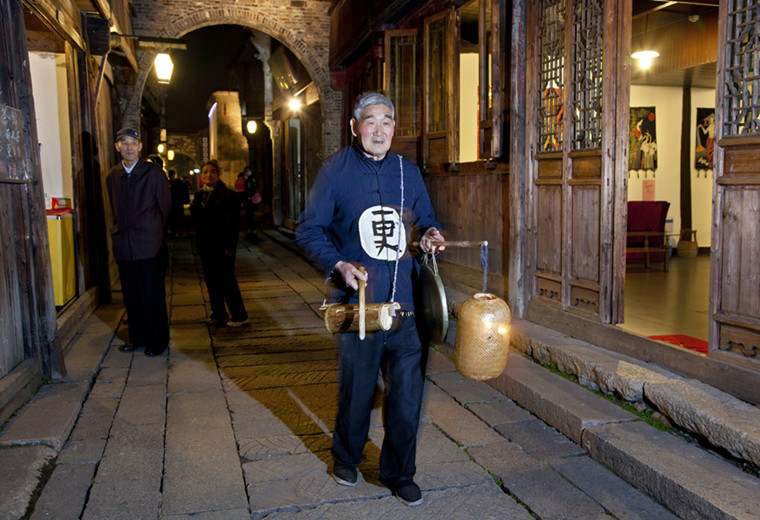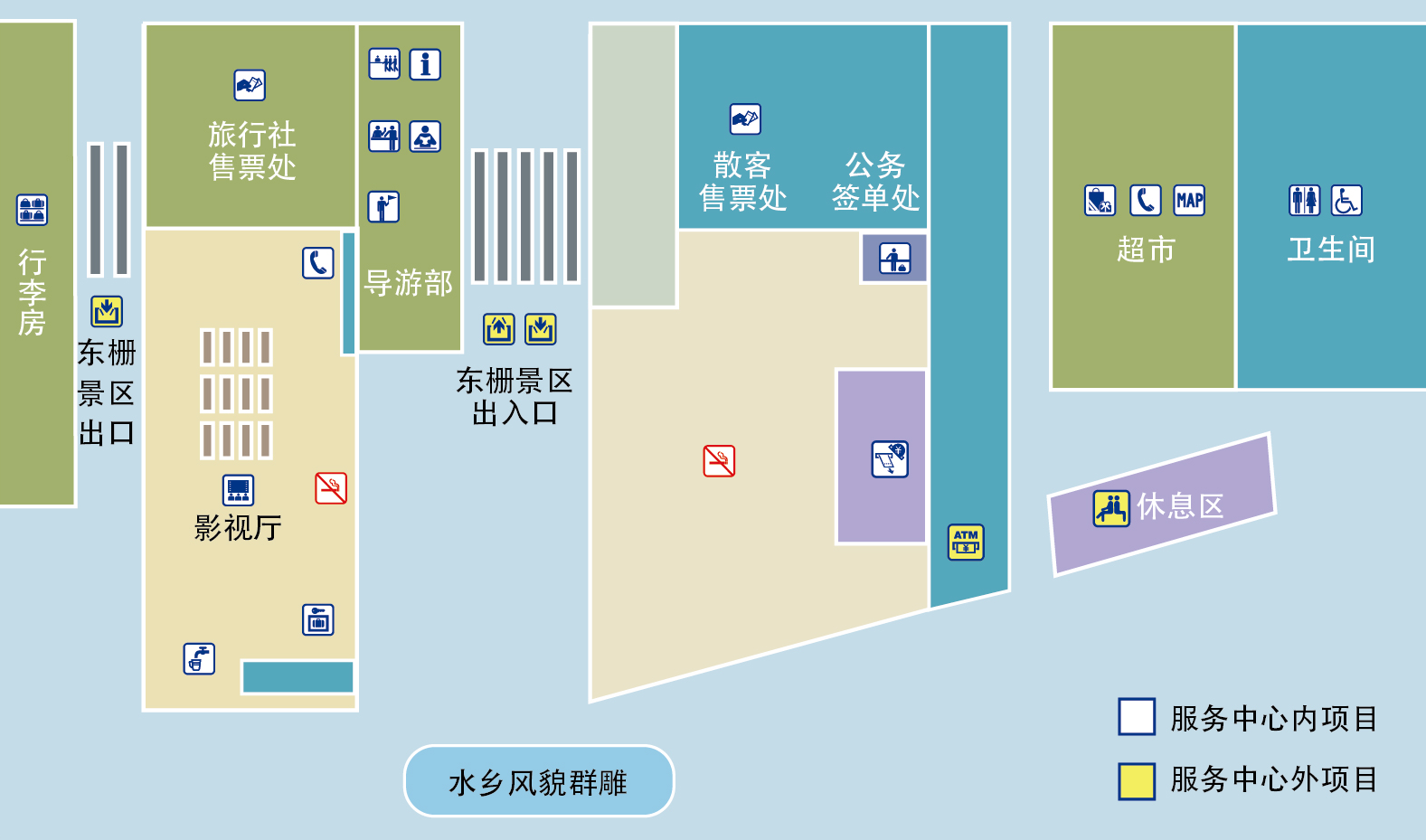

1. New Year greetings
The first day of the first lunar month is the Spring Festival, formerly known as the "Chinese New Year", and is the most solemn traditional festival. The previous day was called New Year's Eve, commonly known as "New Year's Eve", and the whole family gathered to have a "New Year's Eve Dinner". The bride presented her shoes to the elder in full attire, named "Farewell". The elder gave money to the bride and children, named "Luchy money". That night, there were also activities such as worshipping the gods and receiving the Kitchen God. Starting from the morning of the first day of the lunar New Year, people open the door and set off firecrackers, burn incense and worship the Heavenly God, named "Receiving the God". Next, worship the ancestors, then worship the parents, followed by the elders and children, and then greet the relatives and friends and celebrate the New Year, collectively known as "New Year's greetings". Modern times have gradually simplified and no longer kneel down. On the first day of the New Year, there will be no guests. Go out and take the "Joy God Position". On the second day of the New Year, there will be mutual visits between relatives and friends until the Lantern Festival.
2. Walking on a bridge on the Lantern Festival
The 15th day of the first lunar month is the Lantern Festival, commonly known as "the first half of the first lunar month". The Wuzhen people have the custom of walking on bridges. Three or five people travel together at night, and they at least must cross ten bridges along the way, and do not turn around bridges, so when starting to walk, it is necessary to have a plan in mind. This custom originated from a commonly popular disaster avoidance and relief activity that focused on women in the old days, known as "walking the ten bridges" or "removing all kinds of diseases". At that time, women walked in groups with each of their usual pots of medicinal herbs after dressing up. When crossing the bridge, they threw the pots into the river, believing that this would ensure a disease-free and disaster-free year. In modern times, the act of throwing medicine pots disappeared and evolved into a simple holiday amusement and prayer activity. On the evening of the Lantern Festival, people, old and young, with lanterns, walk along the river and on the bridge in groups. From a distance, it is spectacular.
There are no high hills in the Wuzhen area, and people use bridges instead of climbing to exercise and eliminate diseases. In particular, the bridges of bridge in the West Gate have many high arches. Walking on these two high bridges during the Lantern Festival, you really feel relaxed and happy.
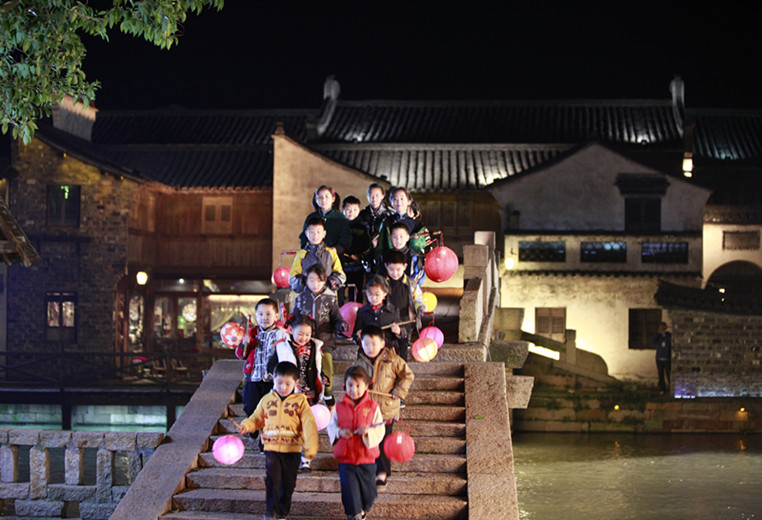
3. Qingming outing
Qingming is one of the twenty-four solar terms, which merged with the Cold Food Festival after the Tang Dynasty. Ancestor worship, tomb sweeping, and spring outings are common customs everywhere. In Wuzhen, there are many customs related to sericulture. "Qingming Night" before Qingming, the people make green dumplings, wrap Zongzi, offer oblations "Rang White Tiger", paint bows and arrows with lime in front of the door to pray for silkworms, boil snails, and ate snails with needles, which is called "Tiaoqing". Starting from the Qingming Day, The sericulture farmers from four townships go to Pujing Temple to burn incense and pray for silkworms, known as the "Incense Fair". At that time, merchants gather, visitors are numerous, and there were rows of stalls and performing arts on the open land. In the river harbor, white boats and boxing boats competed and fought bravely, lasting for more than half a month to become a carnival for aquatic sericulture farmers.
4. Weighing at Beginning of Summer
Beginning of Summer is also one of the 24 solar terms, and on the day, people taste broad beans, taste salted eggs, eat green plums, taste cherries, called "Taste new". Farmers make "Beginning of summer cake" with malt, "grass head" and powder, friends and relatives offer it each other. Three of five children make an appointment, carry bamboo tube, pick broad beans, beg bacon, pick up wild wood, collect a hundred meters of rice to burn "wildfire rice" with supported pot in the outdoor base stove, it is said to avoid a summer disease after eating the rice. Weighing at Beginning of Summer is the most prosperous in Jiangnan. It is said that during the Three Kingdoms period, Adou, the son of Liu Bei, was taken to Jiangdong in the summer. Mrs. Sun weighed him face to face and raised her carefully. Later, she weighed him again every year and wrote to Zhuge Liang to show her dedication, which has spread into the folk and become a custom.
5. Eating Xongzi during the Dragon Boat Festival
The fifth day of the fifth lunar month is the Dragon Boat Festival, also known as the "Tianzhong Festival". Every family wraps up Zongzi and relatives and friends give each other as gifts. It is said that this custom originated from the memory of Qu Yuan. The ancients regarded "double fives" as the "poisonous gas overflowing, ghosts active" "evil day", so the Zhong Kui diagram was hung and the Heavenly Master's Talisman was pasted. Artemisia argyi, calamus, peach branches, and garlic were hung in front of the door to ward off evil spirits. People ate Yellow croakers, drunk realgar wine, and even eaten snakes and insects to fight against poison. Children wore tiger shaped clothing, and women cut the silk fabrics into a bag to store realgar and wear it as a symbol of strength. At noon, Aoki chiharu, Angelica dahurica, turtle shell and Ruta are used to "beat mosquito smoke", realgar wine is sprayed on the corner of the wall, and quicklime water is sprinkled to repel insects. All these things have the nature of removing evils.
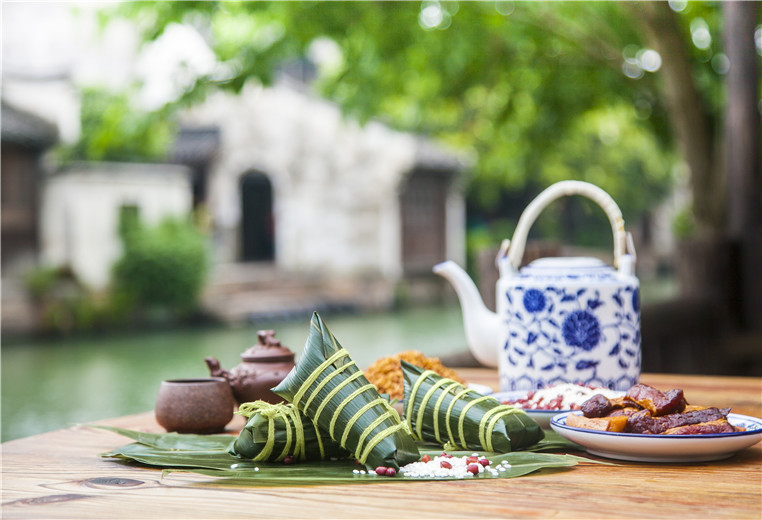
6. Dragon assignment and color rain
The 25th day of the fifth lunar month is the "Dragon Assignment Day", also known as the "Dragon Assignment Festival". Legend has it that the Dragon Kings of Siyu went to their respective jurisdictions on this day; hence the name is dragon assignment. On the day, a fire drill is held by the Fire Hose Association, a public welfare fire-fighting organization as usual. At that time, the fire hose group in each square would assemble in teams, bring all the fire-fighting equipment, and gather on the open river in the town. Some put various colors of pigments in hoses and buckets in advance. At one command, gongs and drums rang, and all hoses spray into the air at the same time, showing the splendor of colorful waterfalls. Men, women, old and young gathered to watch and cheer. The winner is the one with fast water flow and long range.
7. Expose insects in the sun
On the sixth day of the sixth lunar month, it is during the scorching summer sun. There is a saying in Wuzhen that "on the sixth day of the sixth lunar month, duck eggs are cooked in the sun”. It is indeed a good time to expose insects and mold. In the Song Dynasty, it was designated as the "The day Present Saves", but its origin was a carefully fabricated dream story by Emperor Zhenzong Zhao Huan. Later generations found it boring, so they used the traditional "Book Exposure Day" on the seventh day of the seventh lunar month. Scholars and households dried books, temple monks and nuns dried scriptures, ordinary people dried clothes in the sun, and there was also a custom of leading cats and dogs to bathe in the river. It is said that it can avoid lice and moths. Town people put the hot water in the sun for children to bathe, and women washed their hair on the day. The custom of eating Wonton of every household may be derived from mixed bath.
The 15th day of the seventh month of the lunar calendar is the Zhongyuan Festival, commonly known as the "Half of July". On that day, Taoist temples celebrate feasts, Buddhist temples perform "Ullambana Assemblage", Buddhism and Taoism practice together, and people worship their ancestors, so it is also called the "Ghost Festival". After the Southern Song Dynasty, there was a popular custom of lanterns entering the river on the night of the Mid Yuan night. Various flower shaped lanterns woven with bamboo strip and pasted with paper, in which candles are burned, are supported by boards, or they were pasted into boat shapes with various colored papers, and a little rush oil was lit in them. At night, they are placed at the water's edge or in the river by boat. The candlelight shines and drifts with the tide, which is a spectacle. For this reason, Buddhists and disciples refers to this as "Compassionate navigation and universal crossing", and Taoists referred to it as "Illuminating the darkness to guide the way", while the common people only regarded it as a form of entertainment.
9. Enjoy the moon on the Mid-Autumn Festival
Lunar August 15 is the traditional Mid-Autumn Festival, when the moon is the most round and most bright in autumn. The ancients regarded the full moon as a symbol of family reunion, so also known as "Reunion Festival". On the evening, family members get together for a feast, relatives and friends give each other festival gifts, and in the meantime, moon cakes are indispensable. When the moon rises, people are in the courtyard to enjoy the moon. Besides moon cakes, there are seasonal fruits and vegetables, such as melons, taro, lotus root and edamame. Most of them are still placed at the table as offerings, which are made by gluing paper boards with thread incense, and various colorful flags are inserted on them, affixing the story of the Moon Palace. They are wonderful to make, and it is burned outdoors for praying for a bumper harvest.
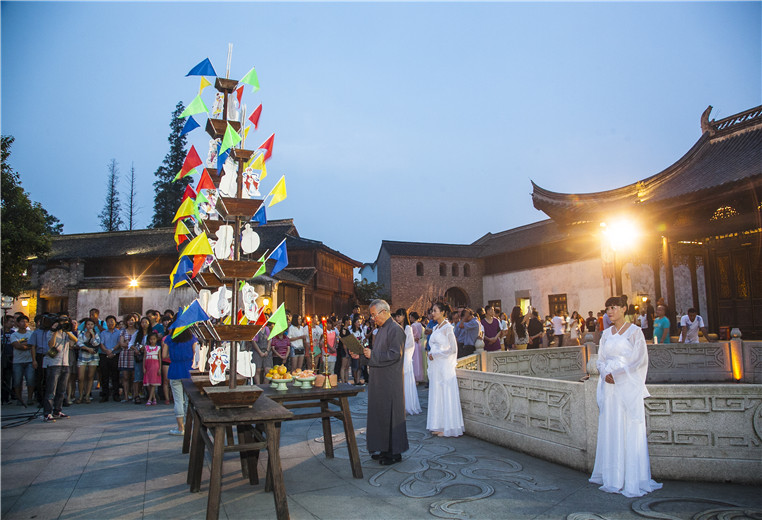
On the 15th day of the eighth lunar month is the traditional Mid-Autumn Festival when is just the "half of the three autumns". On that day, the moon is the most round and brightest. The ancients regarded the round moon to symbolize the reunion of their loved ones, the day is also called the "Reunion Festival". On that evening, the families have the reunion dinner together, the relatives and friends exchange gifts, and the moon cakes are the most important. With the moon in the sky, people begin to set up tables with some offerings on it in the courtyard. There are moon cakes, seasonal fruits and vegetables such as melons, Chinese eddo, water chestnuts, lotus roots, and edamame, etc. Most of people burn the incense and put it on the table, and they glue cardboard, put on all kinds of flags, and decorate with the story of the moon palace for later incineration in the outdoor. This is to wish for a good harvest.
10. Climb on Double Ninth Festival
The ninth day of the ninth lunar month is the Double Nines festival, also known as the "Double Ninth Festival" or "Climbing Festival", "Chrysanthemum Festival". The custom of climbing on the Double Ninth Festival and inserting dogwood has a long history. According to legend, it originated from the story of "Huan Jing refuge". In the Eastern Han Dynasty, Huan Jing, a native of Runan, followed his teacher's advice and climbed the mountain by wearing dogwood on the Double Nines festival, avoiding great difficulties. Later generations followed suit and it became a custom. By the Tang Dynasty, it had evolved into a traditional entertainment program, which seemed to have a function of keeping fit and preventing diseases in order to ward off the initial cold. There were no mountains to climb in Wuzhen, so it was replaced by climbing the tower. It was the day when the "Chongyang Cake" was introduced to the market. The cake was made of red beans and glutinous rice, and a small flag was inserted on it, meaning to replace climbing with eating cakes, and inserted the flag instead of inserting dogwood.
11. Worship ancestors at the Winter Solstice
The winter solstice is also one of the 24 solar terms, which is a big festival in traditional customs, also known as "Winter Festival" or "Ya Sui". Before the festival, every family grinds powders and makes "Winter festival dumplings", prepares wine and cooks, and sets up offerings for ancestors, which is quite grand. There is a saying among the people that "the winter solstice is as grand as the New Year". There are also grave-sweepers on the winter solstice. Eighty-one days from the winter solstice are divided into nine "Nines", which is the period of cold winter. According to legend, the old saying "Nine-Nine Cold Relief Map" began in the Ming Dynasty. In the picture, there are 81 petals on a plum blossom, one of which is dyed every day according to the pithy formula from the winter solstice. When they are all dyed, the winter is over and spring begins. People start farming, which is intended to urge people not to forget farming in the leisure.
12. The twelfth lunar month
December of the lunar calendar is commonly known as "The twelfth lunar month". In the past, there was a custom of "Support to sound watches". When entering the twelfth lunar month, all streets and squares set up special personnel to knock gongs and bang at dusk every day, and they patrolled the streets and sometimes shouted: "Be careful with the candles in the twelfth lunar month, close the front door and the back door, look at the firewood room, and watch out for thieves." The cadence of the voice sounds like singing until New Year's Eve. In the cold winter, the climate is dry, and the people used many fires, and the wooden houses in the town are continuous. Once there is a fire, it is serious, so people must be vigilant at all times. At that time, no fewer than ten people in the town supported to sound watches. Every evening, gongs, bangs and shouts came one after another, which was helpful to remind people to pay attention to safety. So far, West Gate still has the duty of the patrolling elderly, which has become a unique landscape.
